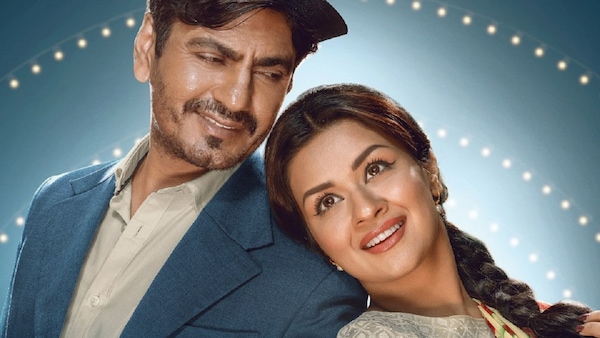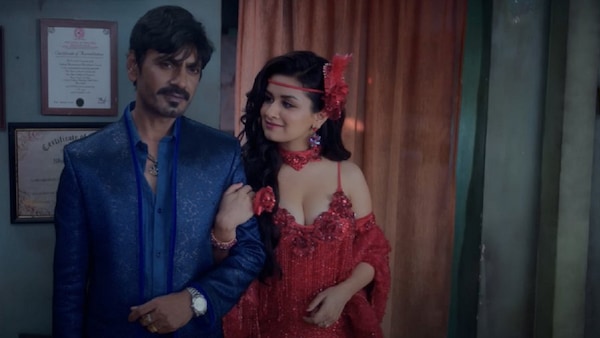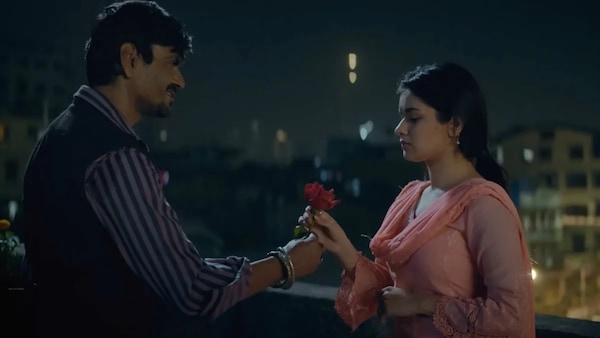Tiku Weds Sheru: A Case Of Band, Baaja, Boredom
This is #CriticalMargin, where Ishita Sengupta gets contemplative over new Hindi films and shows. Today: Sai Kabir's Tiku Weds Sheru.

Last Updated: 02.14 PM, Jun 25, 2023
IT is only June and Tiku Weds Sheru is already the worst Hindi film of the year. This is both a lament and a prediction…not a threat. Sai Kabir’s directorial outing is unimaginably bad, almost child-like in its insistence to not make sense. It is so abysmal on all grounds that everyone involved with it should file a defamation case against each other. There is no way they agreed to be part of the project knowing how it was going to unfold. And if they did, then they should file a defamation case against themselves. In my mind, this instance of self-harm is more worrying than the time filmmaker Karan Johar invited actor Kangana Ranaut on his talk show Koffee With Karan in 2017 only to be called out for enabling nepotism by her on national television, and later by many for six straight years.
Mentioning Ranaut was deliberate. She is the producer of Tiku Weds Sheru. There is little surprise there. On a broad level, Kabir’s film is about the impossible dreams people from smaller cities harbour when they come to Mumbai and the brutality with which the city treats them. But he is no Zoya Akhtar (no one is), and Tiku Weds Sheru is no Luck by Chance. The premise then, which encourages exploration of stardom, self-esteem, and the slippery slope of destiny, is deflated as a one-sided depiction of outsiders. But within this capacity, the film displays no curiosity to understand the variance of plight and struggle, the misfortune of birth, and the hardship of gender. Instead, it unfolds as a sluggish, often impossible-to-sit-through tragedy porn of outsiders, only to perhaps accentuate the accomplishment of the likes of Ranaut who has left no chance in the recent past to reiterate her outsiderly status in an industry populated with nepo-babies.
The brief, I am assuming, was to dial up the adversities. In the wise words of Khatana bhai from Rockstar, Kabir was asked to milk “dukh, dard, aansoon”. What better way to do it than to design it as a love story of two struggling actors? He is from Mumbai and she is from Bhopal. Both dream of making it big in the Hindi film industry. He falls for her, she does not. They get married. He leaves the shady business he was involved in, puts his life at stake to give her a comfortable one. It is fun while it lasts. She eventually realises the deception but more crucially, recognises the cruelty of the place. She falls in love with him as they join forces against the city.

To be fair, even as a ‘love story’ there is nothing to like. Much of it has to do with the fact that everything feels derivative. As the title suggests, Tiku Weds Sheru borrows its outline from Tanu Weds Manu. Tasleem Khan aka Tiku (Avneet Kaur) is a manic-pixie dream girl like Tanu. Her room in Bhopal is adorned with posters of Jab We Met and Bunty Aur Babli. Shiraz Khan Afghani aka Sheru (Nawazuddin Siddiqui) is dubious but hopelessly in love, not unlike Manu. The drill is the same. He is always in awe of her. When she drinks, he looks at her, astonished that girls can do some things unassisted. When she breaks into a dance, he stares, amazed that she can move without being held. When she breaks, he cries. When she is in danger, he turns up as a girl. Wait, what?
I am not sure if the intent was to underline Sheru’s love for Tiku but several instances in the film unravel with such incredulity that it made me question if what I was looking at was reality or some incohesive dream cooked up by my tired brain. Take for instance how Sheru becomes a drug peddler with such swiftness as if he was changing clothes, has a change of heart by just holding a baby, and starts crying in the middle of confrontations to evoke sympathy, laughter...honestly I don’t know. Every scene in Tiku Weds Sheru inhabits such contrasting energies that they seem to be written by at least 10 different people. The idea perhaps was to explore the possibility of a moment but some wise person decided to keep all 10 scenarios. Thus, every scene goes everywhere and somehow, nowhere.
Tonality is a joke. Tiku is slapped by her brothers for laughs, a politician grazes his hand near Sheru’s crotch for laughs, aspirations of people from small towns are reduced to laughs by portraying them using the shorthand of incorrect English (Tiku ends her sentences with ‘periods’ instead of ‘period’), and actors like Vipin Sharma, Mukesh Bhatt and Zakir Hussain are made to be the laughing stock. There is a subplot of rival politicians in the film which is so half-baked that I am convinced the diktat was to edit chunks of their scenes to give weightage to the plight of outsiders…Dukh, dard, aansoon.

More crucially, it is impossible to look at the lead actors kissing and be comfortable with their visible age gap. Kaur is 21 and Nawazuddin Siddiqui is 49. I understand the futility of raising such a concern given how normalised such culture is in Hindi films but even armed with this normalcy, there are scenes which stand out precisely because of how young Kaur looks before a very jaded Siddiqui. Moreover, the story provides no justification for the age difference. It is disorienting. No less than a Kangana Ranaut cameo where she walks by with a scar on her forehead as if she was returning from attending the baby shower of a nepo-kid.
If Ranaut is there, can you keep Muslims behind? For some inexplicable reason all the main characters in Tiku Weds Sheru are Muslims, as is the slimy man who promises Tiku work only to exploit her, and the dodgy politician. The only reason I can think of for such generous representation is to stress on their dubiety and barbarity (Tiku’s brothers hit her freely, Sheru slaps her).
Which brings me to the worst thing about the worst film of the year: Nawazuddin Siddiqui. You know a film is unsalvageable when watching Siddiqui act reminds you of Subhash Ghai. Much like Sudhir Mishra’s Afwaah, the actor here too speaks in English. And much like the 2023 film, his portrayal feels doubly removed like his performance is aware of the performativity. On paper this should work. Sheru is supposed to be a misunderstood artist. Having found no footing on screen, he sees reality as prompts to display his acting chops. His reactions are always heightened. But the actor goes full campy all the time. As if somewhere even he has forgotten to recognise the distinction. The fall is so sharp and shameful that it gets difficult to look at him on screen.
There is just one moment in the film where my anger towards him was offset by pity. His friend questions his absence from the shady work they do together, and Sheru, rather tearfully says, “I want to be a family man now”. It is impossible to watch the scene and not see it for what it is: a cry for help where the actor is sending a subliminal message. I just hope Raj and DK are listening.
(Disclaimer: The views expressed in this column are those of the author and do not necessarily reflect the official policy or position of OTTplay. The author is solely responsible for any claims arising out of the content of this column.)
